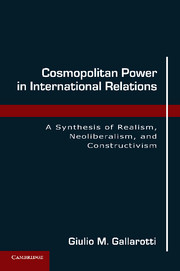 Cosmopolitan Power in International Relations
Cosmopolitan Power in International Relations Book contents
- Frontmatter
- Contents
- Preface
- Introduction
- 1 The Theory of Cosmopolitan Power
- 2 Crucial-Case Textual Analysis of the Founding Fathers of Realism
- 3 Crucial-Case Textual Analysis of the Founding Fathers of Realism
- 4 Case Studies of Soft Empowerment
- 5 Case Study of Hard Disempowerment
- 6 Case Study of Soft Empowerment
- 7 Conclusions
- Appendix Formal Model of Cosmopolitan Power
- References
- Index
1 - The Theory of Cosmopolitan Power
Published online by Cambridge University Press: 05 June 2012
- Frontmatter
- Contents
- Preface
- Introduction
- 1 The Theory of Cosmopolitan Power
- 2 Crucial-Case Textual Analysis of the Founding Fathers of Realism
- 3 Crucial-Case Textual Analysis of the Founding Fathers of Realism
- 4 Case Studies of Soft Empowerment
- 5 Case Study of Hard Disempowerment
- 6 Case Study of Soft Empowerment
- 7 Conclusions
- Appendix Formal Model of Cosmopolitan Power
- References
- Index
Summary
Cosmopolitan power represents an attempt to construct a more viable theory of power – especially in a contemporary context – by employing tenets from visions of power across the three main paradigms of international relations: Realism, Neoliberalism, and Constructivism. The main principles undergirding Cosmopolitan power carve out an intersecting niche for these tenets. The conventional vision of power that has traditionally dominated the study of international politics, and still reigns today, derives from Realism. This vision embraces the viability of hard power resources as the principal means of acquiring influence in the world system. Yet hard power alone is insufficient to effectively realize this objective, and if employed in excess, it can prove self-defeating and actually weaken a nation (i.e., hard disempowerment). Power-seeking can be made more effective by integrating the use of soft power into national strategies for acquiring influence (i.e., soft empowerment). Soft power demonstrates properties that are consistent with Neoliberal and Constructivist visions of power. The dominant vision of hard power has always reflected suboptimal qualities as a strategy for optimizing the influence of nations, but changes in international politics in the modern world system have rendered it still more deficient relative to strategies that make greater use of soft power. These changes have increased the effectiveness of soft power relative to that of hard power. Strategies that combine the two sources of power hold the potential to achieve results superior to those achieved with strategies that rely excessively on either one alone. These strategies revolve around the three signature processes of Cosmopolitan power, which challenge the dominant vision of power espoused by Realists. These include soft empowerment (the need to raise a nation's influence through the increased use of soft power), hard disempowerment (avoiding the dangers of overreliance on hard power, which carries self-defeating consequences), and the superiority of a prudent combination of hard and soft power over the excessive use of either one (optimal diversification between hard and soft power). Acquiring the best strategies for optimizing influence, even under a Cosmopolitan orientation, will continue to be quite challenging. Finding the right mix of hard and soft power will require leaders to be especially perspicacious in following a number of important decision-making strategies with respect to how national influence is evaluated and monitored.
- Type
- Chapter
- Information
- Cosmopolitan Power in International RelationsA Synthesis of Realism, Neoliberalism, and Constructivism, pp. 16 - 75Publisher: Cambridge University PressPrint publication year: 2010


